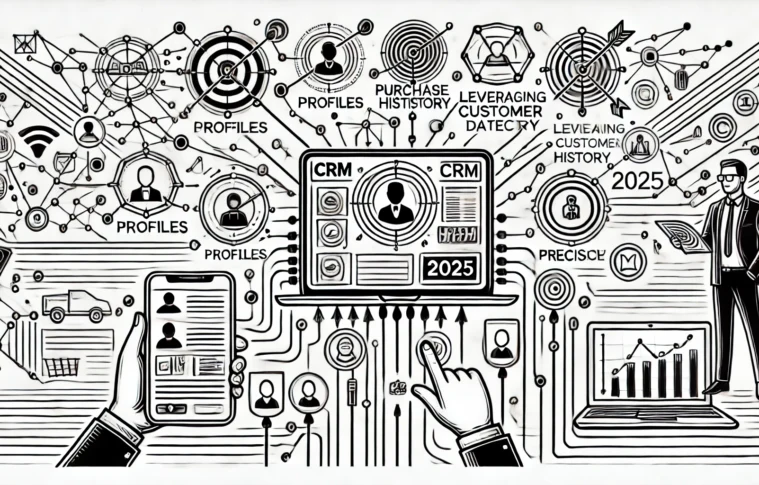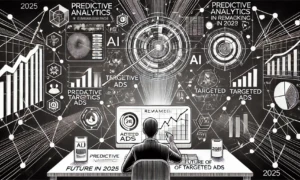In 2025, customer relationship management (CRM) systems are not just tools for managing leads; they’ve evolved into powerful engines for driving precision in remarketing campaigns. By integrating CRM data into remarketing strategies, businesses can achieve unmatched personalization and relevance, significantly boosting conversions and customer loyalty. This blog explores the transformative role of CRM in remarketing, the latest trends, and actionable strategies to maximize its potential.
What Makes CRM Essential for Remarketing?
At its core, CRM software collects and organizes data about customer interactions, preferences, and behaviors. When combined with remarketing efforts, CRM data enables businesses to:
- Segment Audiences: Group customers based on demographics, purchase history, and engagement levels.
- Personalize Messaging: Deliver tailored content that resonates with each segment’s needs and interests.
- Track and Optimize Campaigns: Monitor customer responses and refine remarketing strategies in real-time.
Key CRM platforms like Salesforce, Zoho CRM, and HubSpot have enhanced their capabilities to support seamless integration with remarketing tools, making the process more efficient than ever.
Latest Trends in CRM-Driven Remarketing
- AI-Powered Segmentation Advanced CRMs now leverage AI to identify high-value customer segments, predict purchase intent, and automate audience targeting for remarketing campaigns.
- Real-Time Data Syncing Integrations with tools like Google Ads and Meta Ads Manager enable real-time syncing of CRM data, ensuring ads are always relevant and timely.
- 360-Degree Customer Views Modern CRMs provide a holistic view of the customer journey, allowing marketers to pinpoint the best moments to re-engage users.
- Integration with Conversational AI Platforms like Salesforce Einstein integrate CRM data with chatbots and virtual assistants, creating personalized retargeting experiences.
Case Study: CRM-Driven Remarketing Success
Company: HealthPro Fitness, a subscription-based wellness platform.
Challenge: High churn rates among monthly subscribers and low engagement from trial users.
Strategy:
- Leveraged HubSpot CRM to segment users based on trial activity, subscription status, and fitness interests.
- Sent personalized email campaigns to trial users with exclusive discounts and curated workout plans.
- Integrated CRM data with Google Ads to retarget users who engaged with their app but didn’t convert.
- Used automated workflows to send SMS reminders to lapsed subscribers, encouraging reactivation.
Results:
- A 40% reduction in churn rates within six months.
- A 25% increase in trial-to-subscription conversions.
- A 30% higher click-through rate (CTR) on personalized Google Ads compared to generic ads.
How to Leverage CRM for Remarketing
- Choose the Right CRM Opt for platforms like Salesforce, Zoho CRM, or HubSpot that offer robust integration with advertising and email marketing tools.
- Segment Your Audience Use CRM data to create highly specific customer segments based on:
- Purchase history
- Browsing behavior
- Engagement levels
- Automate Campaigns Set up workflows to trigger remarketing campaigns automatically based on user actions, such as abandoned carts or subscription cancellations.
- Integrate with Ads Platforms Sync CRM data with platforms like Google Ads and Meta Ads Manager to deliver personalized ads across channels.
- Measure and Optimize Use CRM analytics to track campaign performance metrics, such as CTR, conversion rates, and ROI, and make data-driven adjustments.
The Future of CRM in Remarketing
As CRM technology continues to evolve, its role in remarketing will become even more pivotal:
- Hyper-Personalized Campaigns AI-driven CRMs will craft campaigns tailored to individual preferences in real-time.
- Omnichannel Integration CRMs will seamlessly integrate with new platforms, from smart TVs to voice assistants, enabling remarketing across emerging channels.
- Predictive Analytics Enhanced predictive capabilities will allow businesses to anticipate customer needs and engage proactively.
- Privacy-First Remarketing CRMs will adopt advanced encryption and data anonymization to comply with stringent privacy regulations while maintaining campaign effectiveness.
Conclusion
In 2025, CRM systems are no longer just supportive tools; they are the backbone of effective remarketing strategies. By leveraging CRM data for segmentation, personalization, and campaign optimization, businesses can create meaningful connections with their audiences and drive long-term success. As technology advances, the synergy between CRM and remarketing will only grow stronger, empowering businesses to deliver unparalleled customer experiences.
Disclaimer
Posts in the Notebook are written by individual members and reflect personal insights or opinions. Please verify any information independently. If you have any concerns, notify the admin immediately so we can take action before any legal steps are taken.





